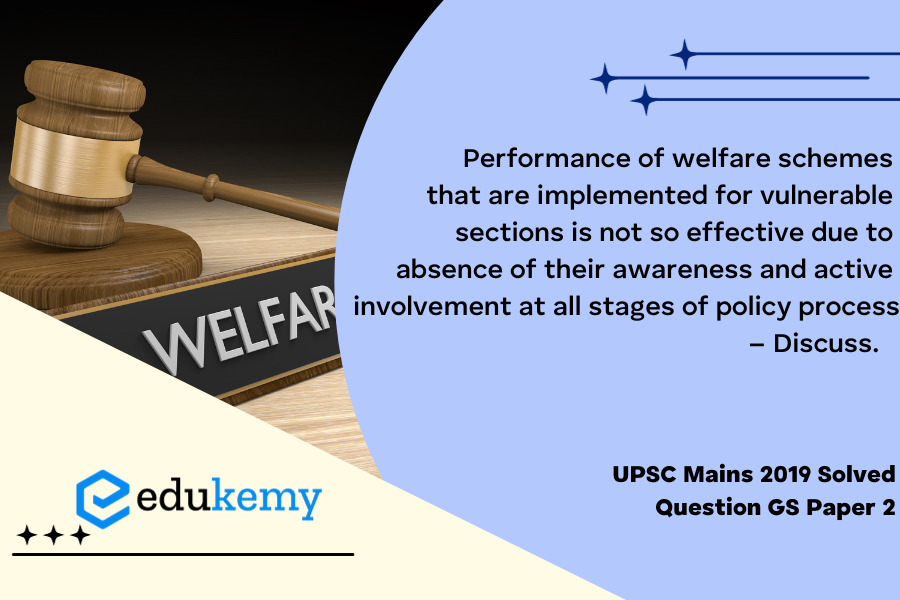The performance of welfare schemes targeted at vulnerable sections is often hindered by the lack of effectiveness arising from the absence of awareness and active involvement of the beneficiaries at all stages of the policy process. While governments and organizations strive to implement inclusive policies to uplift the underprivileged, the success of these initiatives heavily depends on the degree to which the intended beneficiaries are informed and engaged. One of the primary challenges lies in the inadequate dissemination of information about the welfare programs, leading to a lack of awareness among vulnerable communities. This information gap results in a significant portion of the target population remaining oblivious to the available schemes, thus rendering the policies less impactful than intended. Furthermore, even when awareness exists, the absence of active involvement from the beneficiaries in the policy formulation, implementation, and evaluation stages further compromises the effectiveness of these welfare measures. Meaningful participation is crucial to ensure that policies align with the specific needs and challenges faced by the vulnerable sections. Without active engagement, there is a risk of policies being detached from ground realities, leading to inefficiencies and suboptimal outcomes. Therefore, a comprehensive approach that prioritizes awareness campaigns and encourages the active participation of the vulnerable sections throughout the policy process is essential for enhancing the overall performance and impact of welfare schemes designed for their betterment.
Tag: Welfare schemes for vulnerable sections of the population by the Centre and States and the performance of these schemes.
Contents
Decoding the Question:
- In the Introduction, try to briefly write about the welfare schemes for vulnerable sections and their performance.
- In Body, discuss various reasons for the ineffective performance of welfare schemes.
- In Conclusion, try to end your answer by asserting some data and recent policy.
Answer:
The welfare schemes are the schemes, designed to provide the necessary means for the development of individuals, groups or a community. Generally, they are targeted towards the vulnerable and marginalized section of the society.
However, It is observed that the benefits intended to be delivered to the people through these schemes do not reach the beneficiaries because of weakness in administrative planning delivery mechanisms and lack of awareness of the targeted groups. It is also observed that many development projects and programs have failed in the past because of the inadequacies in the design, implementation, involvement, and general awareness about the policy in the public.

Reasons for the Ineffective Performance of Welfare Schemes:
- Due to a lack of adequate funds, an appropriate policy framework, and effective delivery machinery, the implementation of development programs in the past was not successful.
- Various public services programs function inefficiently due to a lack of motivation, accountability, absence of performance appraisal, absence of a system of incentives and penalties, understaffing and poor working conditions on the one hand, and large-scale leakages on the other.
- Studies suggest that the ‘leakage’ is estimated to be between 20 and 70 percent in numerous rural development programs.
- The weak track record of implementation of these programs and failure to deliver intended benefits to the poor have been documented in various reports and studies, including the Comptroller and Auditor General reports and surveys by international agencies and other independent bodies.
- The targets of the schemes are too realistic or optimistic, based on technical and non-technical parameters without the knowledge of the local situation, proper database, and resource constraints, making the policies suffer at last.
- There is a lack of strict time frames, financial mechanisms, and inter-agency cooperation pose challenges.
- There is no adequate, user-friendly grievance redressal mechanism to make the schemes efficient and effective.
Measures to Make Policies More Effective:
- The implementation of development programs by the State Governments must be more effective.
- Close monitoring can be organized in selected areas such as implementing schemes relating to primary health, primary education, watershed development, empowerment of the local people to discharge their responsibilities effectively at the local level, as evidenced by the implementation of poverty alleviation programs, etc.
- The monitoring can be done based on questionnaires designed by selected public institutions in consultation with the Planning Commission.
- Incentives for improving implementation should be built into the criterion for allocating additional funds to the States. The States that demonstrably perform better are entitled to more development assistance than the States that do not effectively implement these programs.
The quality of the policy framework and the effectiveness of the implementation of the policies are as important as the availability of resources for the realization of the intended policy objectives. The availability of funds alone is not sufficient for tackling socio-economic problems like poverty and backwardness. Both implementing bodies as well as the benefitting people have to be aware of each others’ situations and work harmoniously.
In case you still have your doubts, contact us on 9811333901.
For UPSC Prelims Resources, Click here
For Daily Updates and Study Material:
Join our Telegram Channel – Edukemy for IAS
- 1. Learn through Videos – here
- 2. Be Exam Ready by Practicing Daily MCQs – here
- 3. Daily Newsletter – Get all your Current Affairs Covered – here
- 4. Mains Answer Writing Practice – here


